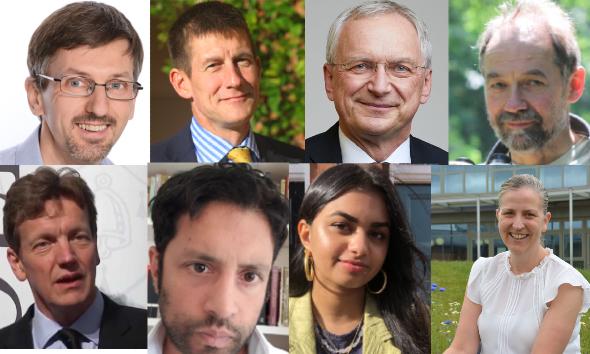
The achievements and contributions of individuals from the University of Cambridge and its Colleges have been recognised in this year’s Queen’s Birthday Honours list.
Dr Shaun Fitzgerald, Director at the Centre for Climate Repair at Cambridge, and Fellow of Girton College, has received an OBE for services to the COVID-19 Response.
Sir John Aston, Harding Professor of Statistics in Public Life, has been knighted for services to Statistics and Public Policymaking.
Sir Andy Hopper, Professor of Computer Technology in the Department of Computer Science and Technology, has been knighted for services to Computer Technology.
Professor William Sutherland, Miriam Rothschild Chair in Conservation Biology in the Department of Zoology, and Fellow at St Catharine’s College, has been awarded a CBE for services to Evidence-based Conservation.
Professor James Wood, Head of the Department of Veterinary Medicine, Alborada Professor of Equine and Farm Animal Science, and Fellow of Wolfson College, has been awarded an OBE for services to Veterinary Science.
Dr Arif Ahmed, University Reader in Philosophy, and Fellow of Gonville and Caius College, has received an MBE for services to Education.
Amika George, a History undergraduate at Murray Edwards College, received an MBE for services to Education.
Aimee Durning, a Teaching Assistant at the University of Cambridge Primary School, has received an MBE for services to Education.
Dr Shaun Fitzgerald was called upon in Spring 2020 to help with the SAGE Environmental Modelling Group. He co-authored the CIBSE Emerging from Lockdown guidance, which includes building ventilation. He serves on several COVID-19 response government bodies, such as the DCMS Venues Steering Group, Science Board to the Events Research Programme (including Circus Nightclub (Liverpool) and FA Cup Final in 2021) and the Aerosol Generating Procedures panel.
Sir John Aston, a world-renowned statistician working in the Department of Pure Maths and Mathematical Statistics, has worked to promote trust in the use of statistics and quantitative evidence. As Home Office Chief Scientific Adviser, he championed the use of science and research across the department, and his work has contributed to national security and public safety. He has played a central role in the Home Office’s response to COVID-19, with latest scientific advice being made available to brief the Home Secretary.
Sir Andy Hopper’s, pioneering work in computer systems and architectures has led to breakthrough impact on the modern digital world. The work, with alongside his team, tackles global issues on biodiversity and climate change. With a strong commitment to diversity, as Head of the Department of Computer Science and Technology in Cambridge for 14 years, he helped increase the number of women appointed as staff from a handful to over half within the department. He is the Royal Society Vice-President and Treasurer.
Professor Bill Sutherland’s extensive research explores ecological processes, predicting environmental change impact, horizon scanning to identify forthcoming issues and developing novel processes, which integrates science and policy. He runs the Biosecurity Research Initiative (BioRISC) at St Catharine's College, and regularly advises government and national conservation organisations. Professor Sutherland, who was President of the British Ecological Society, helped create the Cambridge Conservation Initiative, which works to identify and research global environmental problems.
Professor James Wood’s research focuses on zoonoses - diseases transmissible from animals to humans – in particular bovine tuberculosis in the UK, Ethiopia and India, and its impact on milk-producing cattle and buffalo. His work also focuses on wildlife-associated emerging viral infections in sub-Saharan Africa, particularly Ghana. Professor Wood is on Defra’s Science Advisory Council and he is a Fellow of the Royal College of Veterinary Surgeons.
Dr Arif Ahmed has been recognised for his contribution to the University Statement on Freedom of Speech. He raised concerns that including a requirement to be respectful of people's opinions and identities risked legitimising future censorship, which he saw as a threat to the free speech the University was trying to protect. An amendment was put forward stating that free speech should operate without fear of intolerance, which, along with other amendments, was passed by the Regent House - the University's governing body. Cambridge’s Vice-Chancellor Professor Stephen Toope said the outcome was an emphatic reaffirmation of free speech in the University.
Amika George started the not-for-profit Free Periods campaign group, following the story of girls in the UK missing school for lack of access to sanitary products. The campaign momentum led to governmental committed to funding period products in every single state school and college in England in 2019.
Aimee Durning used the power of stories and reading to help young people and their families cope during the pandemic, through a book club, ensuring access to teaching resources. She established an East of England Teaching Assistant’s regional network, sharing best practices, skills development, and particularly in helping vulnerable children.

